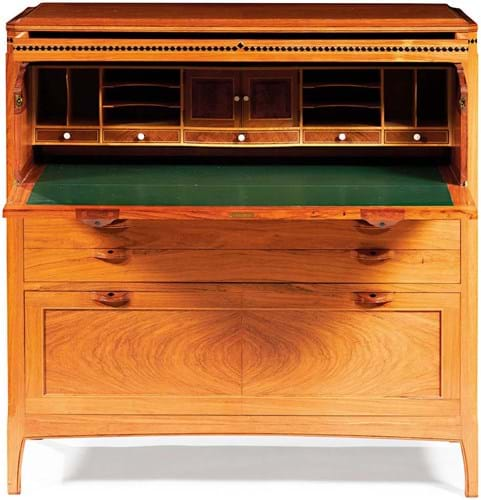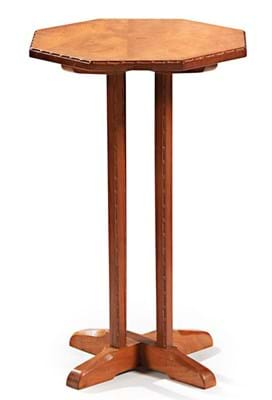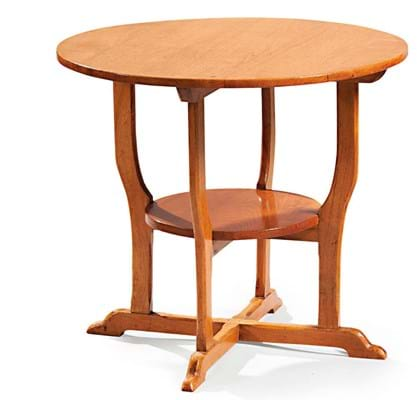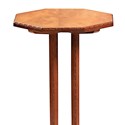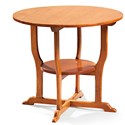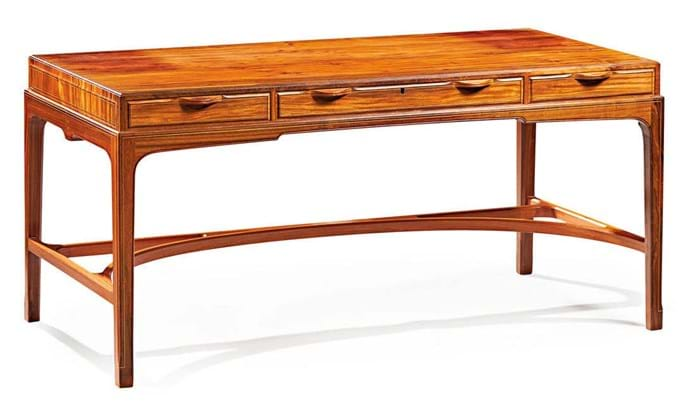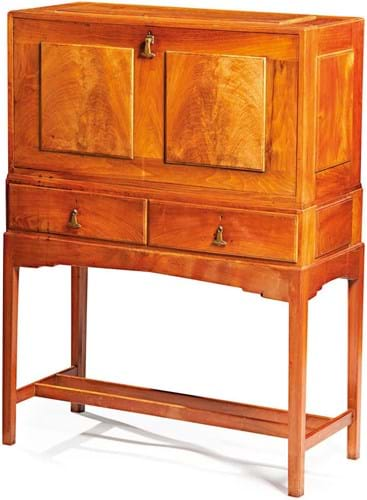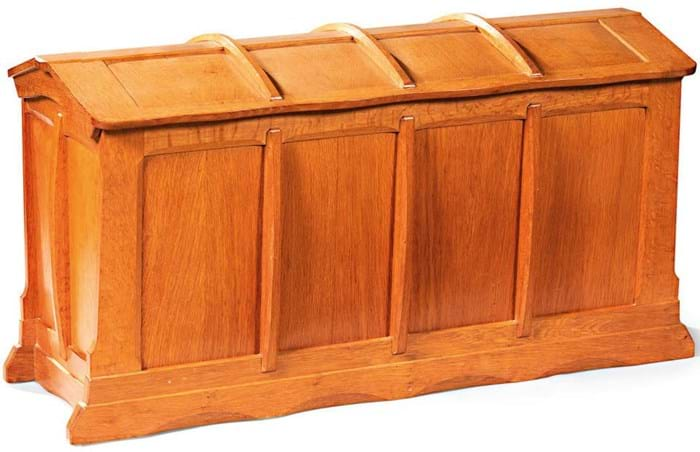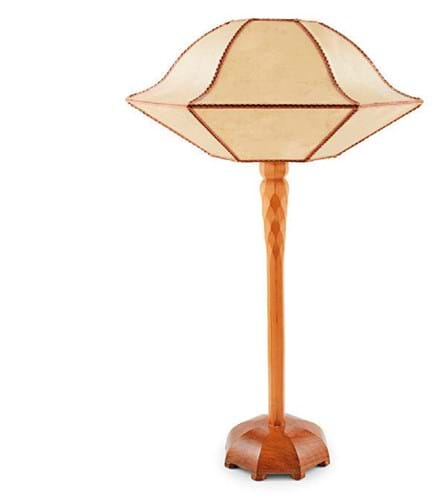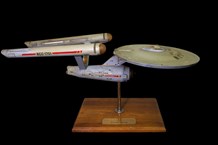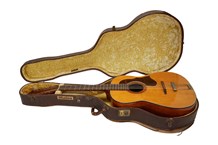The first sale of the year for the design department on January 11 was a ‘white-glove’ event with all 65 lots sold.
John Mackie, head of decorative arts and design at L&T, said: “The interest we had is testament to the quality of the furniture offered and reflects the rare opportunity to buy from a collection which had been commissioned and purchased by the same family from the 1930s almost to the present day.”
John Minoprio had grown up surrounded by Arts & Crafts furniture by two key makers. Some pieces, made at the Chalford workshop of Peter Waals (1870-1937) in the 1930s, had been designed by his father Anthony Minoprio (1900- 88). Others from the mid-century era were penned by Edward Barnsley (1900-87) and made by his craftsmen at Froxfield in Hampshire.
To these, John would add his own commissions and purchases, creating an archive that covered almost the entire career of Barnsley and his contemporaries.
There were prices to inform the market throughout.
As an ambitious young architect setting up home and business in the late 1920s, Anthony had held clear ideas of his own about furniture design. His collaboration with Waals produced a group of pieces that combined classic ‘Cotswold School’ features (such as revealed construction, inlaid lines and solid English timbers) with Deco elements that were distinctively of their time.
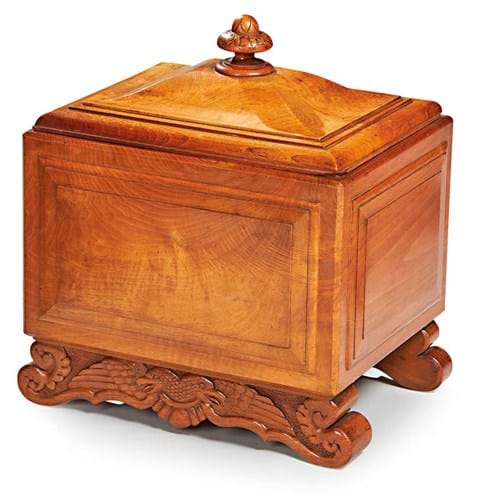
Walnut cellarette by Peter Waals and John Skeaping to a design by Anthony Minoprio – £2400 at Lyon & Turnbull.
Of a style
Typical were a walnut cocktail cabinet with chequer beaded inlay and pink mirrored interior, c.1935, sold for £5000 and a quirky walnut cellarette with carved decoration by the Royal Academician John Skeaping that brought £2400. Skeaping and Anthony Minoprio had met as students in Rome and were friends.
Later, in 1952 Anthony had approached Barnsley with the idea of creating new work in a lighter style suited to modern life. At the time Barnsley was only starting to introduce machinery into the workshop – driven by economic necessity, Many of these ‘mid century’ pieces chimed perfectly with contemporary taste.
The first commission, a freestanding boot and shoe cupboard made in walnut with ebony and sycamore inlay, had cost £161.10. Sixty years later, it was bid way past its estimate of £2000-3000 and sold for £24,000 – a record for Barnsley furniture. It was pictured in the News pages of ATG No 2525.
Barnsley buys
Like father, like son, in time John would enjoy his own relationship with the Barnsley workshop. When left a legacy in 1966, he spent it on his first three pieces of Cotswolds School furniture, beginning a close friendship with Barnsley, who would stay with him in Cheshire on his way to walking holidays in the Lake District.
Among the pieces commissioned in the early 1970s was a writing desk fashioned in Indian rosewood inlaid with sycamore and ebony with a walnut interior. It bears an inscription under a drawer reading This writing desk was designed for Mr John Minoprio by Edward Barnsley and made by assistant George Taylor in the Froxfield Workshop in 1971. It was estimated at £3000-5000 but sold for £18,000.
Pieces made for John’s office at Training Films International in 1981-2 were the very last designed by Barnsley himself. These included a desk c.1981 made in Indian padouk, with sycamore and ebony inlay, sold for £15,000, and an en suite twodrawer filing cabinet at £4200.
After Barnsley’s death, John continued to commission new work from Jon Barnsley and James Ryan at the Edward Barnsley Workshop.
The most recent piece in the collection was a striking oak writing table from 2015. Ryan designed this sculptural table – shown at the Masterpiece fair in London also in 2015 – “to look as though it has been formed from a single block of wood”.
The black, open-grained finish was achieved by scorching, then wire brushing the surface before applying a solution of vinegar and iron oxide. This very different aesthetic was rewarded with a bid of £5500.
Earlier creations
John also found himself attracted to earlier Cotswolds School and related Arts & Crafts work which he enjoyed finding at specialist dealers in Burford and London.
Among the finest of these was a Barnsley walnut secretaire desk from c.1933 with brass handles by Waterlane metalworker Alfred Bucknall. One of several lots acquired from The Fine Art Society (FAS) on Bond Street, it was sold together with an original drawing signed and dated May 1933 for £18,000.
The same price was awarded an oak and walnut kitchen dresser of a similar date. Also ex-FAS, it had once belonged to Herbert Simon (1898-1974), the industrial archaeologist and rail enthusiast who turned the Kynoch Press into one of Britain’s leading fine printing houses.
A beautifully made four-panel oak and cedar blanket chest with a domed lid by Barnsley pupil Oliver Morel (1916-2003) dated 1969 sold for £3800. It had been bought from Phillips in the 1990s.
A walnut and yew table lamp, with sewn parchment shade, c.1950, was the work of the Warwickshire craftsman Hugh Birkett (1919-2002). Bought by John from Liberty, it proved the day’s most eagerly contested lot when, estimated at £400-600, it sold for £7000.


